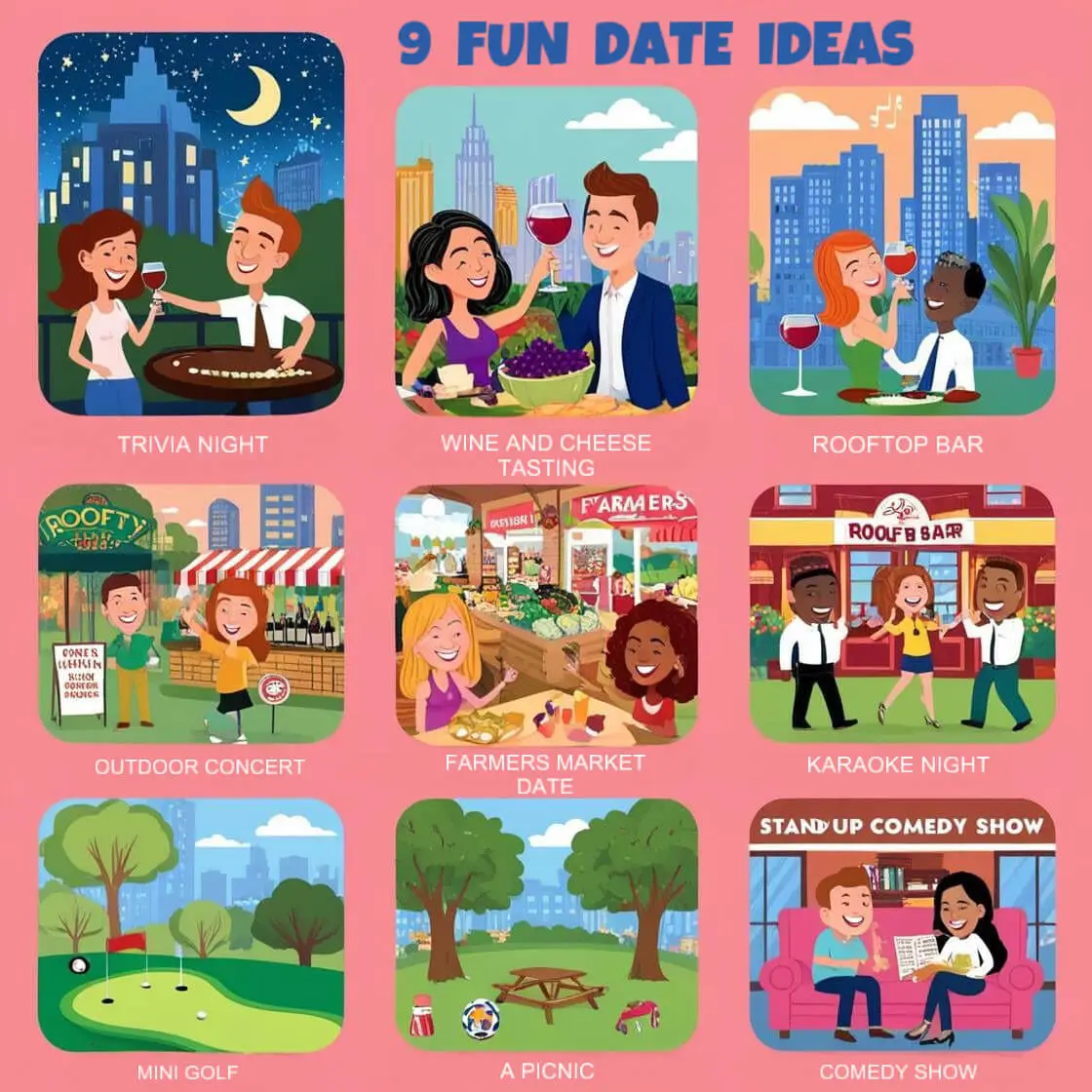September 19, 2024
How to Reject Someone Nicely IRL & Over a Text
Have you ever found yourself in the awkward position of having to give someone the legendary “No”? Or you even feel the urgent need to say no to somebody, but don’t know how?
This article provides tips on how to reject someone nicely in a friendly way. Read further to learn more and become a master of rejection without hurting their feelings.
How to Politely Reject Someone
If you want to kindly reject someone, you have to be clear and honest while respecting their feelings:
- Focus on your perspective by using “I” statements, show gratitude for their interest, and keep your message simple and kind.
- Avoid leading them on or over-explaining—something as straightforward as, “I appreciate your interest, but I don’t feel the same way,” can work effectively.
- Never underestimate the importance of the right timing.
Key Takeaways:
- Be honest, yet respectful: Avoid excuses and lies at all costs, and keep the conversation respectful.
- Express gratitude: If you don’t like another person’s opinion, stay grateful. Reflect this positively in your communication.
- Avoid blaming: Nobody likes embarrassment, so stick to first-person messages.
- No false hope: Few things are as hurtful as thinking someone likes you, only to realize it was false hope.
- Avoid phrases like, “Maybe in the future.
Good example phrases:
- “I appreciate your interest, but I don’t think we’re a good match.”
- “You’re a great person, but I don’t feel a connection between us.”
- “Thank you for reaching out, but I’m not in the right place for a relationship.”
- “I value your honesty, but I don’t feel the same way.”
- “I respect your feelings, but I’m not looking for anything romantic right now.”
- “It’s kind of you to share how you feel, but I don’t see this going further.”
- “I enjoyed our time together, but I don’t think this is what I’m looking for.”
- “You’re wonderful, but I just don’t feel a romantic spark.”
- “I hope you understand, but I don’t see this progressing any further.”
- “I’m honored by your interest, but I don’t feel the same way.”
Still at loss for words? Don’t bury your head in the sand. We will help you choose the right phrase.
The Office Example: Jim Rejection of Pam
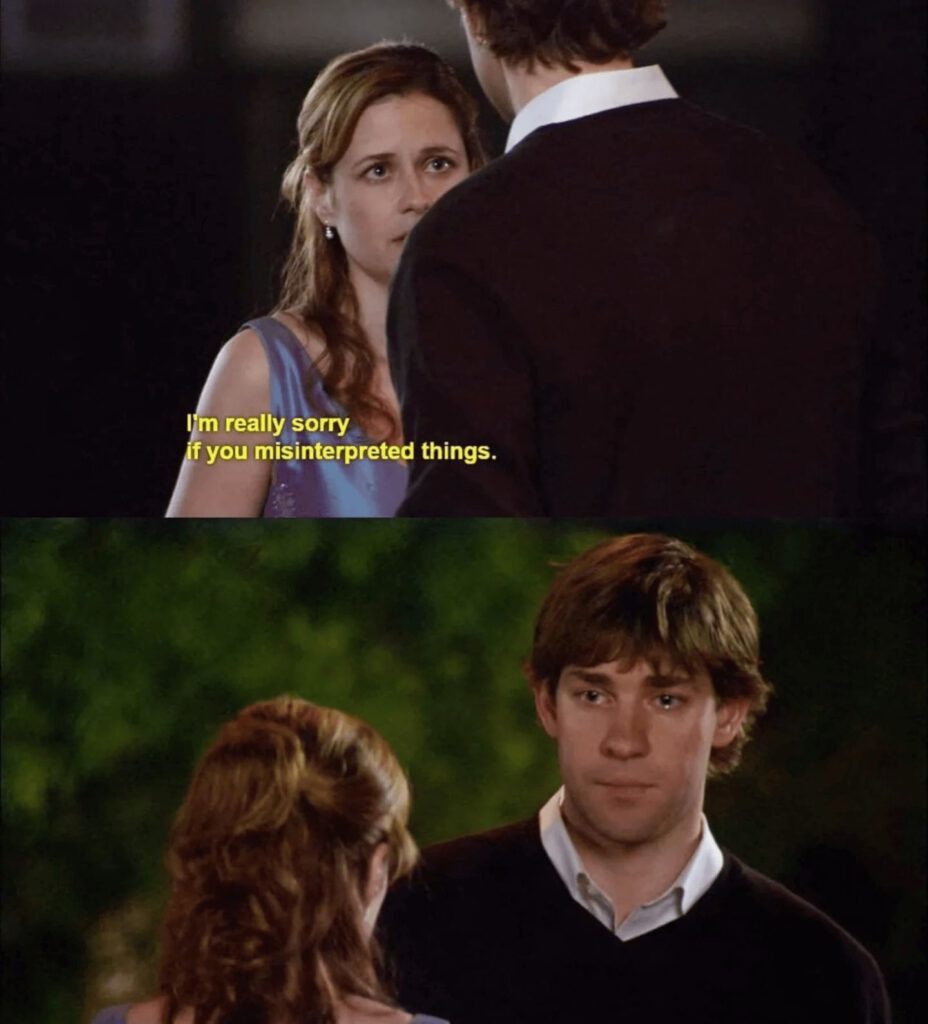
Source: r/DunderMifflin reddit
In the earlier seasons of The Office, Jim harbors romantic feelings for Pam, who is engaged to Roy. Jim, knowing that Pam is already in a committed relationship, respects her boundaries and keeps his feelings to himself for a long time.
However, in Season 4, when Pam is still with Roy, Jim subtly rejects the idea of pursuing a relationship with Pam while being supportive of her situation.
- How Jim Rejects Pam Nicely: Jim doesn’t openly declare his feelings to Pam when she’s engaged, but he makes it clear that he wants to maintain a friendship while respecting her choice. For example, when Pam gets upset or frustrated with Roy, Jim listens and provides emotional support without pushing his own feelings onto her. He never forces the issue, and when Pam becomes single, Jim takes the opportunity to express his feelings honestly and respectfully without pressuring her.
- Key Takeaway: Jim’s rejection is not about telling Pam “no” in a harsh way; instead, it’s about stepping back to let Pam figure things out on her own. It’s a delicate balance of respecting someone’s current relationship while still holding onto hope. His patience and understanding make it clear that he’s not rejecting her, just allowing her to make her own decisions.
This example shows how Jim handles a tough situation with tact, emotional intelligence, and respect, which is a great reflection of how to approach rejection with care.
It’s not always about saying “no” directly but respecting boundaries and timing while being emotionally supportive.
How to Turn Down a First Date
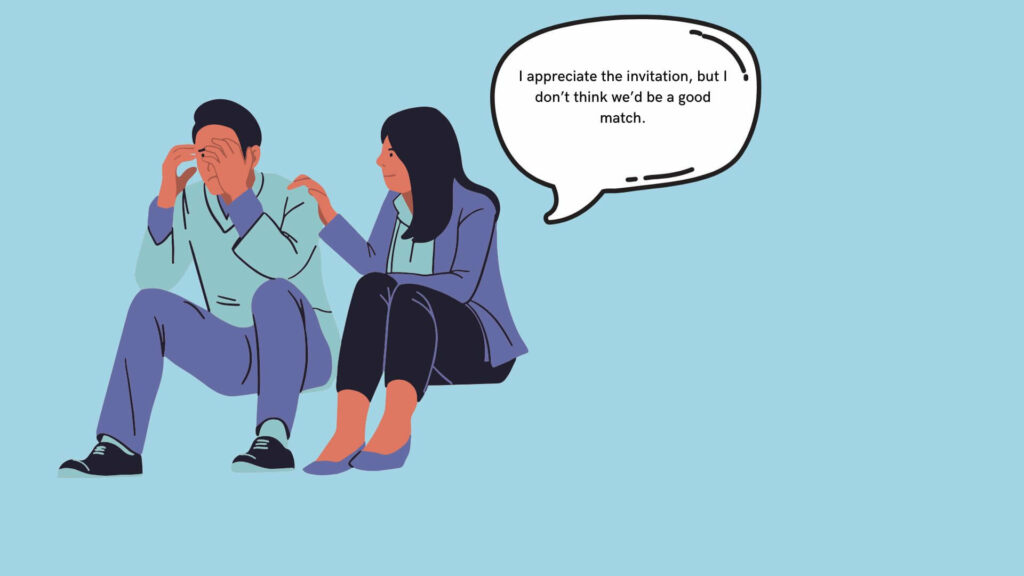
If the spark isn’t there on a first date, set the facts straight to avoid raising hopes.
1. Be Honest and Direct
Clarity is key. Let the person know you’re not interested without beating around the bush.
Example: “Thank you for asking, but I don’t feel a romantic connection.”
2. Show Appreciation
Acknowledge their courage in asking you out.
Example: “I really appreciate you reaching out—it means a lot to me.”
3. Use “I” Statements
Focus on your own feelings rather than pointing out their flaws.
Example: “I’m not in a place to date right now, but I wish you all the best.”
4. Avoid Giving False Hope
Be clear about your decision so they don’t misinterpret your response.
Example: “I don’t think we’re a good match, but I really appreciate your interest.”
5. Keep It Simple
A long explanation isn’t necessary and might make things more awkward.
Example: “Thanks, but I’m not interested in dating at the moment.”
How to Turn Down a Follow-Up Date
Was the first date a success – or were you not sure and wanted to give your date a second chance? If you are sure now, act immediately.
1. Simple and Direct
“I really enjoyed our time, but I don’t think we’re a match for a second date.”
2. Respectful and Appreciative
“I appreciate you asking, but I don’t feel the connection I’m looking for. I hope you understand.”
3. Kind but Clear
“Thank you for a nice time, but I don’t think we should pursue this further.”
4. Brief and Honest
“I think you’re great, but I don’t see this going anywhere romantically.”
5. Honest and Considerate
“I’ve given it some thought, and I don’t feel a spark. I wish you all the best.”
How to Reject Someone Who Has a Crush on You
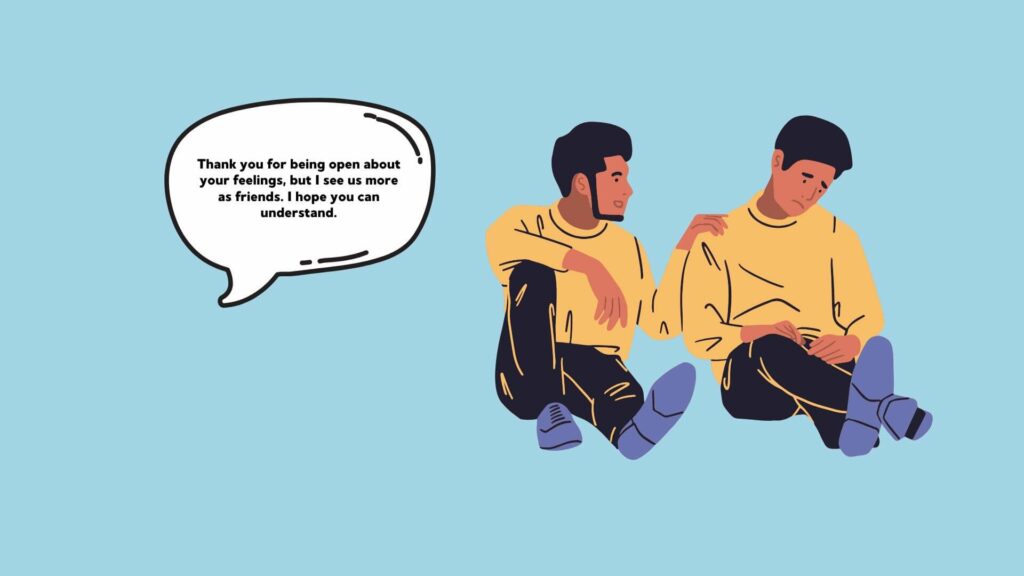
Make it look normal: It’s always flattering when someone confesses their feelings to you. But the person doesn’t match what you envision in a partner? Keep a cool head and try:
1. Be Honest but Gentle
“I really appreciate you telling me how you feel, but I don’t feel the same way. I hope you can understand.”
“You’re an amazing person, but I don’t feel a romantic connection. I hope we can still stay friends.”
2. Acknowledge Their Feelings
“It means a lot that you shared this with me, but I don’t feel the same. I hope this doesn’t affect our friendship.”
“I’m flattered by your feelings, but I don’t see us as anything more than friends. I hope you’re okay with that.”
3. Keep It About You, Not Them
“I’m not in a place for a relationship right now, but I really value our friendship.”
“I’m not looking for anything romantic, but I think you’re a great person.”
4. Be Clear and Firm
“I appreciate your honesty, but I don’t think we’re meant to be more than friends.”
“I respect how brave you are for sharing this, but I don’t think this is something I can pursue.”
5. Show Respect and Empathy
“You’re a fantastic person, and I appreciate your feelings. I just don’t feel the same way.”
“Thank you for opening up to me; I respect you a lot. I don’t feel the same, but I hope we can stay friends.”
How to Reject Someone Nicely in Person
Rejecting someone in person is always best. Isn’t it? Yes, even for negative answer, it’s better to talk in person than over a text.
1. Set a Comfortable Tone
Choose the right setting: Find a private or calm place to have the conversation where both of you can feel at ease.
2. Be Clear but Kind
Express your feelings without ambiguity: Let them know that you don’t feel the same way, but do so in a way that’s gentle.
Example: “I’ve really enjoyed getting to know you, but I don’t feel a romantic connection.”
3. Avoid Over-explaining
Keep it simple: You don’t need to justify or explain too much, as it could make things more awkward or confusing.
Example: “I’m just not looking for anything romantic right now.”
4. Focus on Moving Forward Positively
Leave the door open for friendship if you’re comfortable: Let them know you respect them, even if you’re not interested in romance.
Example: “I hope we can still be friends. I really value the connection we have.”
5. Be Compassionate
Show empathy for how they might feel: Acknowledge that it might be tough for them.
Example: “I know this might not be what you wanted to hear, and I really appreciate your honesty.”
How to Reject a Girl Nicely
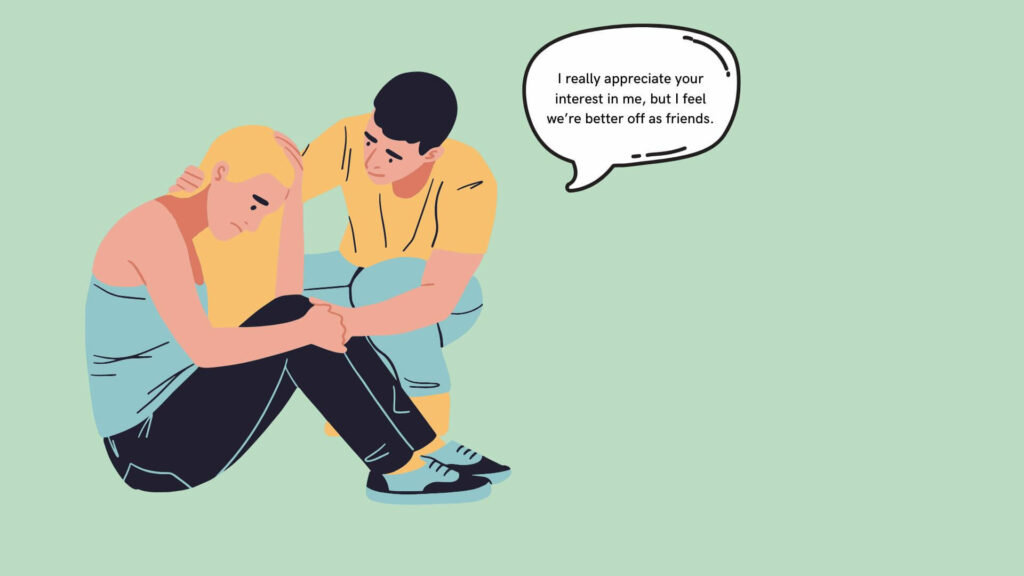
Rejecting a girl nicely is always the kindest approach. Isn’t it? Yes, even for difficult conversations, being honest in person shows respect.
1. Be Direct Yet Considerate
Be straightforward, but deliver your message with care.
Example: “I think you’re a great person, but I don’t feel the same way. I hope you understand.”
2. Be Kind and Sincere
Show gratitude for the time spent together.
Example: “I’m really flattered by your feelings, but I don’t think we’re a good match.”
3. Focus on Your Own Feelings
Keep the conversation about where you stand, not what you think is wrong with her.
Example: “I’m not looking for a relationship right now, but I truly admire who you are.”
4. Express Respect
Make it clear you respect her as a person, even if you’re not interested romantically.
Example: “I have a lot of respect for you, and I hope this doesn’t change things between us.”
5. Offer Support
Acknowledge how tough rejection can be, and let her know you wish her the best.
Example: “I hope you find someone who truly matches what you’re looking for. You deserve that.”
How to Reject Someone You Work with Politely
Did you complete a team assignment and immediately get asked for a private meeting? Now you’re in a tricky situation – after all, you don’t want to completely ruin your business relationship.
Here’s how to do it:
1. Be Direct Yet Considerate
Be straightforward and clear, but also considerate of their feelings. You don’t want to leave them with false hope, but at the same time, you should avoid being overly harsh.
Example: “I think you’re a great person, but I don’t feel the same way. I hope you understand.”
2. Keep Things Professional
It’s important to emphasize that your decision is based on maintaining a professional environment. Let them know that you value your working relationship.
Example: “I really respect our professional relationship, and I think it’s best we keep it that way. I hope this doesn’t make things uncomfortable between us.”
3. Be Clear, but Respectful
Sometimes, being too vague can lead to confusion. It’s best to be honest, but also show empathy and kindness in your words.
Example: “I want to be clear that I’m not looking to pursue anything romantic, but I appreciate your honesty.”
4. Avoid Over-explaining
You don’t need to give long explanations. A simple but direct approach works best in these situations.
Example: “I’m flattered by your interest, but I don’t feel the same way. Let’s continue to focus on our work.”
5. Maintain Boundaries
If the person continues to pursue you, it’s important to maintain firm boundaries and communicate your needs clearly without being rude.
Example: “I value our professional connection, but I think it’s best we keep things strictly work-related moving forward.”
6. Be Understanding
Recognize that rejection can be difficult for anyone, so approach the situation with care and understanding.
Example: “I understand this might be hard to hear, but I hope we can still work together professionally and maintain respect for one another.”
How to Reject Someone Nicely Over Text
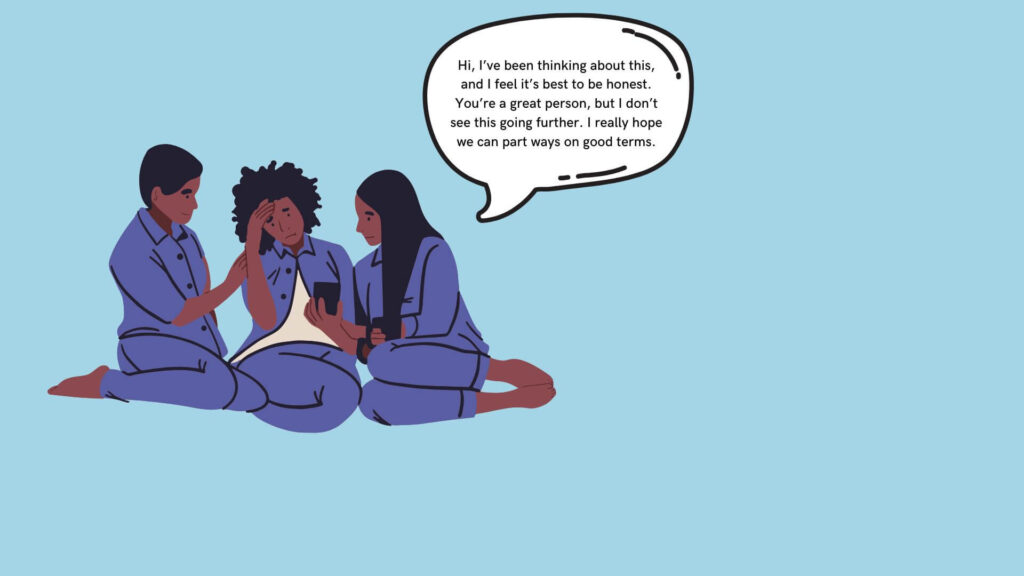
It’s better to tell someone in person if you’re not interested in a second date or meeting. However, if you’re far apart, have only communicated online, or can’t meet soon, texting may be the only option.
1. Communicate directly and clearly
Avoid skirting around the topic at all costs, but instead give brief reasons.
Example: “Hello [name], thank you for your invitation. Unfortunately, I won’t be able to make it. I hope you understand.”
2. Keep a polite tone
You can make mistakes with the written word also. Keep your message friendly to stay positive.
Example: “Hi [name], I wanted to let you know that I can not make it today. I am sorry!”
3. Express your appreciation
Try to show that you appreciate the invitation or the efforts of another person.
Example: “Thank you for thinking of me! Unfortunately, I can’t make it happen, but I would be happy to make it again in the future.”
Do you need more tips? Keep reading – we’ll help you find the right words even in difficult situations.
4. Focus on yourself
Example: “Thanks for reaching out, but I’m not looking for anything romantic right now. I hope you find someone who’s a better match.”
5. Express gratitude
Example: “Thank you for being open with me. You’re an amazing person, but I don’t feel the same way. I hope you can understand.”
6. Stay firm
Example: “I really appreciate you asking, but I don’t think we’re meant to be more than friends. I hope you can respect that.”
7. Appreciative but honest
Example: “I really appreciate you being upfront with me, but I don’t see this going further romantically. I wish you all the best.”
8. Respectful and Warm
Example: “I’m grateful for your honesty, but I don’t think we’re the right match. You deserve someone who feels the same way.”
How to Let Someone Down and Still Be Friends
Let’s say a close friend tells you that he or she has developed romantic feelings. How do you see this?
- Never pretend to have feelings to maintain the friendship under any circumstances. Instead, seek a conversation with the person. The right setting and timing are crucial.
- A quiet, private space works better than a crowded café, where others might overhear or disturb you. You should also avoid having the conversation at an inconvenient time. This may be the case if the other person is under time pressure or having a bad day.
- During the conversation, quickly show how much the friendship means to you and that you don’t want to lose it. Highlight the value of your connection and express your desire to maintain it.
- Choose your words carefully and avoid accusations that might hurt feelings. Use “I-messages” to show respect and give the other person time and space to process the conversation.
Joint activities, such as meeting up with other people in a group or a hobby, can help to redefine the connection. A good basis for looking positively towards the future!
Dating expert John Wellington
Ultimately, the other person, or even you, may need some distance to come to terms with your own feelings. Show understanding, even while letting your friend know you’re still there for them.
After the initial disappointment fades, take steps to strengthen the friendship.
When It’s Ok Not to Be Nice
Kindness is essential to respect someone’s feelings, but being overly polite can sometimes cause misunderstandings and create an unpleasant dynamic.
- A common issue arises when someone refuses to accept your rejection or continues to hope despite clear words.
- Excessive friendliness might be seen as insecurity or even hidden interest.
- If they disregard your boundaries and persist in changing the situation, you need to respond more clearly and directly.
It seems obvious, doesn’t it? Now, let’s look at another situation where kindness might lead to unwanted outcomes.
Imagine you clearly and kindly reject someone, but they respond disrespectfully or behave inappropriately.
If they pressure you, insult you, or show no understanding, respond firmly. Maintain your boundaries to show that their behavior is unacceptable.
What Not to Say When Rejecting Someone
Imagine waking up to this kind of message:

Faux pas alert! (a social blunder or mistake in etiquette, manners, or conduct that can be embarrassing or offensive).
Avoid memorizing these 10 sentences too closely, as they may only result in confused looks and misunderstandings.
- “It’s not you, it’s me.” – Sounds corny and not very credible.
- “I’m sure you’ll find someone better.” – This comes across as patronizing and hurtful.
- “Let’s stay friends!” (too soon) – Can raise false hopes.
- “I’m not ready for a relationship right now.” – Sounds like “maybe later”.
- “You’re not my type.” – Too direct and hurtful.
- “I already have someone.” – A white lie can blow up and make things worse.
- “I just want fun, not commitments.” – Sounds disrespectful.
- “You deserve better than me.” – This comes across as dishonest and evasive.
- “I’m so busy with work/studying/etc.” – Sounds like an excuse.
- Don’t say anything and just disappear. – Ghosting is disrespectful and unfair.
How to Apologize for Ghosting Someone
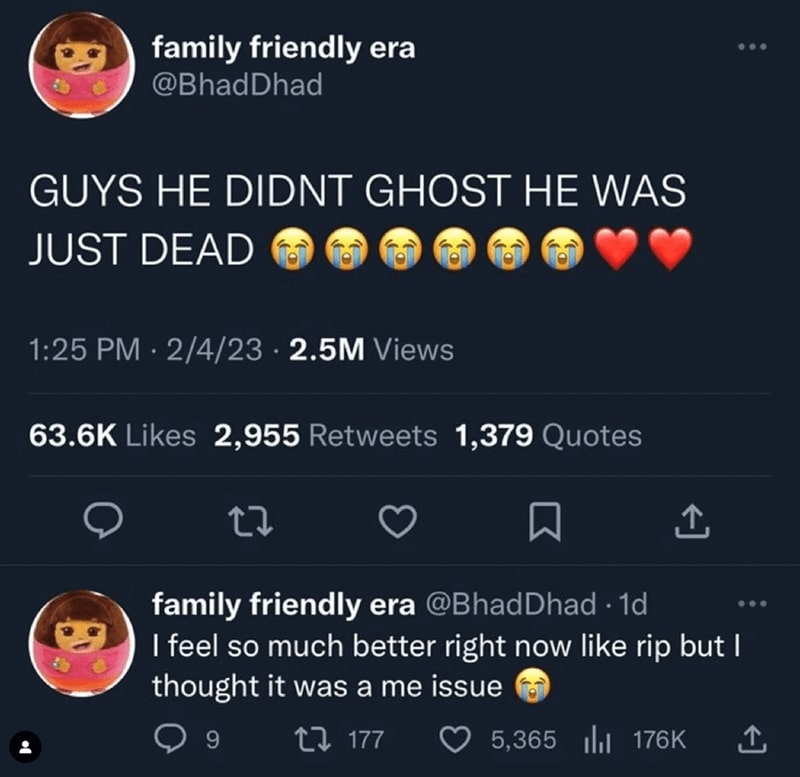
When you’ve ghosted someone, it’s important to acknowledge their feelings and explain your behavior honestly without making excuses. Acknowledge the hurt you may have caused and apologize sincerely.
Let them know that you regret not being upfront and that it wasn’t a reflection of their worth. You can say something like:
I want to apologize for disappearing without explanation. I realize now that I should have communicated better instead of just pulling away. I understand if that hurt you, and I deeply regret not being more considerate. It wasn’t about you; I just didn’t handle the situation the right way. I truly hope you’re doing well, and I appreciate your understanding.
This approach shows that you’re taking responsibility for your actions while expressing genuine regret for the lack of communication. It’s important to be honest, but also to respect the other person’s space and feelings.
How to Accept Rejection Gracefully
You have now learned almost everything you need to know if you want to give someone a rebuff. But what if you become the recipient of the unwelcome message?
Not easy, but no reason to despair. How you react to the rejection shows your inner strength.
- Accept feelings like disappointment or sadness, but don’t let them control your actions.
- A calm response such as “Thank you for your honesty” shows maturity and respect.
- Don’t take rejection personally, and avoid asking for reasons or a second chance—it may seem unpleasant.
Finally, you can also see rejection as an opportunity to grow. After all, you have not failed, but can get to know other people who are better suited to you.
Final Thoughts
If you are wondering on how to reject someone nicely or you’re being rejected, kindness and respect are essential for handling the situation well. Honesty, a polite tone, and avoiding blame can help you choose the right words while considering everyone’s feelings.
Remember: friendly but clear communication creates clarity and avoids unnecessary conflict. If you’re unsure, use the suggested phrases to handle the situation confidently.

